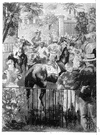paddock
(redirected from paddocks)Also found in: Thesaurus, Idioms, Encyclopedia.
pad·dock
(păd′ək)n.
1. A fenced area, usually near a stable, used chiefly for grazing horses.
2. Sports
a. An enclosure at a racetrack where the horses are assembled, saddled, and paraded before each race.
b. An area of an automobile racetrack where cars are prepared before a race.
3. Australian A piece of fenced-in land.
tr.v. pad·docked, pad·dock·ing, pad·docks
To confine in a paddock.
[Alteration of Middle English parrok, from Old English pearroc.]
American Heritage® Dictionary of the English Language, Fifth Edition. Copyright © 2016 by Houghton Mifflin Harcourt Publishing Company. Published by Houghton Mifflin Harcourt Publishing Company. All rights reserved.
paddock
(ˈpædək)n
1. a small enclosed field, often for grazing or training horses, usually near a house or stable
2. (Horse Racing) (in horse racing) the enclosure in which horses are paraded and mounted before a race, together with the accompanying rooms
3. (Motor Racing) (in motor racing) an area near the pits where cars are worked on before races
4. Austral and NZ any area of fenced land
5. (Team Sports, other than specified) Austral and NZ a playing field
6. (Agriculture) the long paddock informal Austral a stockroute or roadside area offering feed to sheep and cattle in dry times
vb
(tr) to confine (horses, etc) in a paddock
[C17: variant of dialect parrock, from Old English pearruc enclosure, of Germanic origin. See park]
paddock
(ˈpædək)n
(Animals) archaic or dialect a frog or toad. Also called (Scot): puddock
[C12: from pad toad, probably from Old Norse padda; see -ock]
Collins English Dictionary – Complete and Unabridged, 12th Edition 2014 © HarperCollins Publishers 1991, 1994, 1998, 2000, 2003, 2006, 2007, 2009, 2011, 2014
pad•dock
(ˈpæd ək)n.
1. a small, usu. enclosed field near a stable or barn for pasturing or exercising animals.
2. the enclosure in which horses are saddled and mounted before a race.
v.t. 3. to confine in a paddock.
[1615–20; appar. alter. of dial. parrock, Middle English; Old English pearroc enclosure, orig. fence. See park]
Random House Kernerman Webster's College Dictionary, © 2010 K Dictionaries Ltd. Copyright 2005, 1997, 1991 by Random House, Inc. All rights reserved.
paddock
Past participle: paddocked
Gerund: paddocking
| Imperative |
|---|
| paddock |
| paddock |
Collins English Verb Tables © HarperCollins Publishers 2011
ThesaurusAntonymsRelated WordsSynonymsLegend:
Switch to new thesaurus
| Noun | 1. |  paddock - pen where racehorses are saddled and paraded before a race paddock - pen where racehorses are saddled and paraded before a racepen - an enclosure for confining livestock |
Based on WordNet 3.0, Farlex clipart collection. © 2003-2012 Princeton University, Farlex Inc.
paddock
noun field, meadow, pasture, pen, corral (U.S. & Canad.), stockade The family kept horses in the paddock in front of the house.
Collins Thesaurus of the English Language – Complete and Unabridged 2nd Edition. 2002 © HarperCollins Publishers 1995, 2002
Translations
حَقْل صَغير لِتَرويض الخَيْل
výběh
indhegning
bekerített kifutó
hestagirîing
diendaržis
aploks
Collins Spanish Dictionary - Complete and Unabridged 8th Edition 2005 © William Collins Sons & Co. Ltd. 1971, 1988 © HarperCollins Publishers 1992, 1993, 1996, 1997, 2000, 2003, 2005
Collins English/French Electronic Resource. © HarperCollins Publishers 2005
paddock
Collins German Dictionary – Complete and Unabridged 7th Edition 2005. © William Collins Sons & Co. Ltd. 1980 © HarperCollins Publishers 1991, 1997, 1999, 2004, 2005, 2007
Collins Italian Dictionary 1st Edition © HarperCollins Publishers 1995
paddock
(ˈpӕdək) noun a small field, containing grass and usually near a house or stable, in which horses etc are often kept.
Kernerman English Multilingual Dictionary © 2006-2013 K Dictionaries Ltd.